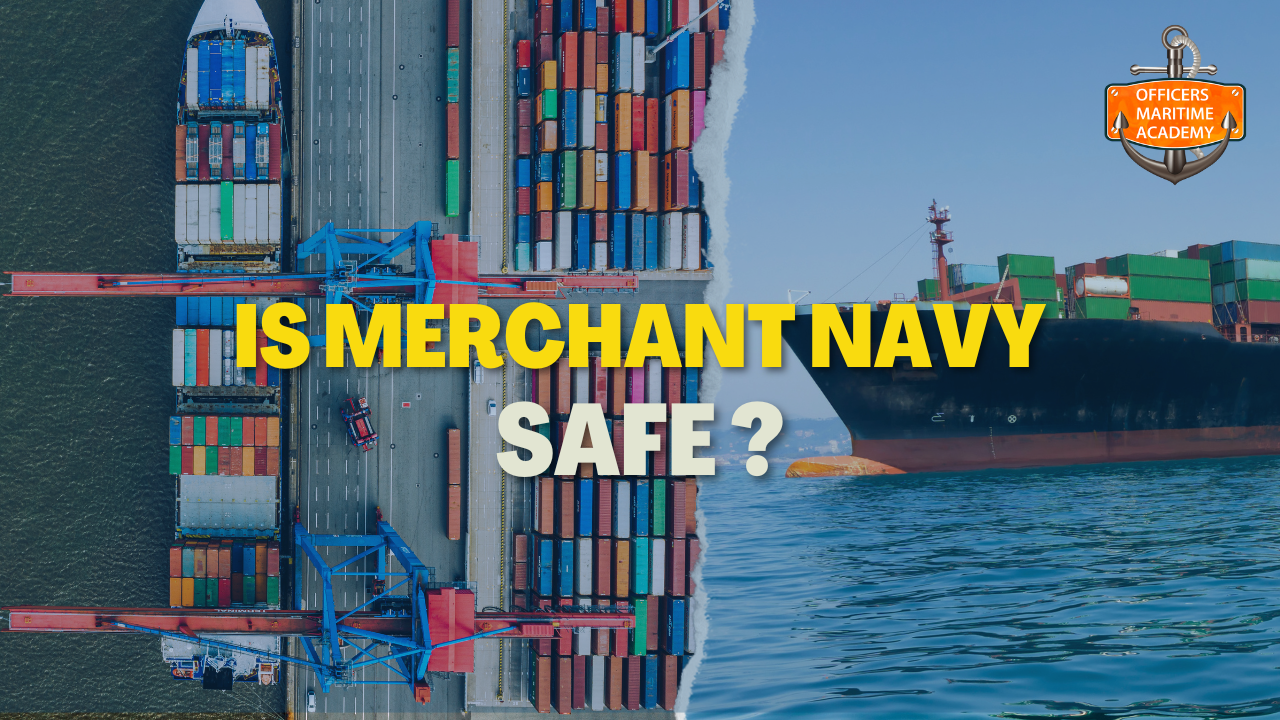
Is the Merchant Navy Safe? Everything You Need to Know
Have you ever wondered, “Is the Merchant Navy safe?” It’s a question that pops up for most people who are considering this adventurous career.

Have you ever wondered, “Is the Merchant Navy safe?” It’s a question that pops up for most people who are considering this adventurous career. You’re not alone—this concern is totally valid. After all, working in the middle of vast oceans, away from family, sometimes with unpredictable weather… it all sounds intense, right?
But here’s the thing—like every job, the Merchant Navy has its risks, but it also has strict safety protocols, tons of training, and a lifestyle that many absolutely love.
Safety can mean a bunch of things depending on who you ask.
Basically, safety in the Merchant Navy isn’t just about accidents at sea. It’s about emotional well-being, long work shifts, being away from land for months, and yes—avoiding pirates (more on that later).
Yeah, totally fair question—and one that comes up a lot. So, is the Merchant Navy safe when you’re actually out there working on a ship? For the most part, yes. In fact, today’s commercial vessels are way more advanced and regulated than people think.
Ships these days are floating cities—equipped with modern tech, emergency response systems, and strict international safety protocols. Every crew member, from cadet to captain, goes through mandatory safety training before stepping onboard.
Here’s what adds to the safety net:
Most companies also follow International Maritime Organization (IMO) rules and make sure everyone has STCW (Standards of Training, Certification, and Watchkeeping) certification.
That said, it’s still a tough job. The ocean doesn’t always play nice, and working long shifts can be tiring. But in terms of actual onboard safety? It’s way more secure than people assume—especially if you follow protocol and work with a responsible shipping company.
Here’s where it gets real. Accidents aren’t common, but they do happen. Engine room fires, slips, equipment malfunctions—these are potential hazards. But the thing is, there’s a safety protocol for almost everything.
Companies are very strict with audits. They lose big money and reputation if something goes wrong. So, regular inspections, maintenance checks, and surprise audits keep things under control. Also, teamwork onboard matters. Most issues come from human error, not the ship itself.
This is probably one of the first things people think about when they ask, “Is the Merchant Navy safe?” Yes, piracy exists, but it’s not like those Hollywood movies. Most dangerous zones are known in advance. Think:
And here’s the good part:
So yeah, there’s a risk, but it’s managed well. No need to lose sleep over this.
While the Merchant Navy offers a lot of adventure and decent pay, it also puts your mental and physical health to the test.
You’re away from home for months. The days blend into nights, especially when you’re working across time zones. Sometimes you don’t even know what day it is. And no, Wi-Fi isn’t always reliable out in the middle of the ocean. That can make staying connected with family a real challenge.
Physically, the job can be demanding depending on your department. Deck officers deal with weather exposure, while engine room staff face heat, noise, and tight spaces. Here are some health concerns that often show up:
Common health issues include:
But ships are trying to be more “human-friendly” now:
Still, If you’re someone who thrives on social interaction, or hates the idea of being offline for more than an hour… this lifestyle might feel suffocating. You’ll need emotional resilience, adaptability, and a strong sense of independence.
Still, with better support systems in place and growing awareness around seafarer well-being, the Merchant Navy is becoming a much safer and healthier career—physically and mentally—than it was even a decade ago.
Every crew member knows this—drills save lives. You’re trained for:
Ships also have a “safety management system” which outlines everything, including evacuation and distress communication. And yes, captains follow international rescue protocols.
Ah, the silent worry. Is the Merchant Navy safe financially? Well, it depends. Merchant Navy jobs are contract-based. You’re hired for a certain number of months, then you’re off.
It’s not like a permanent government job with pensions and PF benefits. But…
If stability is your #1 concern, then it might feel uncertain. But if you’re okay with breaks between contracts, it works out fine.
Also Read: Is Merchant Navy a Good Career Option?
Yes. It’s improving every year. Women now work in all departments—deck, engine, catering—and companies are building safer, more inclusive ships.
Things to know:
It’s not perfect yet, but it’s definitely safer and more welcoming than it was 10–15 years ago.
Good question. Most families just want to know one thing: Are they safe out there?
Thankfully, most ships have:
Some top shipping companies even offer family insurance, death benefits, and travel support in emergencies. So while you’re far away, you’re never totally cut off. Still, emotional gaps can be hard, especially for young kids and elderly parents.
Oh, absolutely.
Safety audits, MARPOL rules, SOLAS guidelines… all of this ensures one thing: ships today are safer than they’ve ever been.
Yes—and no. It’s not a regular 9 to 5 job. You’ll face storms, long shifts, homesickness, and probably some weird food. But with solid training, good companies, and modern systems, the Merchant Navy is a safe career for those who are ready for life at sea.
Here’s a quick recap:
Strong international safety laws
Anti-piracy measures
Health & mental wellness support improving
Female safety being prioritized
Career growth if you stay consistent
So if you’re still asking, “Is the Merchant Navy safe?” — the answer is yes, but only if you’re ready for the ocean’s highs and lows.

Have you ever wondered, “Is the Merchant Navy safe?” It’s a question that pops up for most people who are considering this adventurous career.